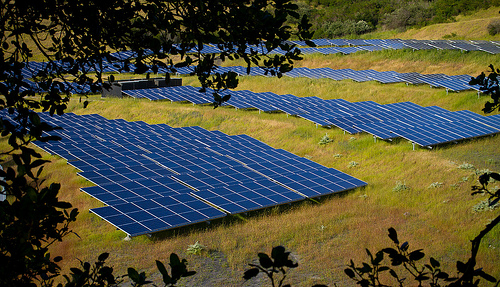Podcast: Play in new window | Download
Subscribe: RSS

Solar farms like this one metastasized across Spain for ten years, proving yet again that if it’s industrial (and heavily subsidized), it’s not sustainable. (Photo by Michael Mees — mcmees24/flickr)
Two of the favorite pipedreams of environmental industrialists and industrialist environmentalists — known here as oxymorons — are on display in Europe this week as what they really are: pipe bombs. The European Union’s embrace of the financial shell game called “Cap and Trade” — promoted as a way to reduce carbon pollution without anyone spending, or doing, anything but make more money — is being declared a bust. And Spain’s embrace of industrial renewable energy has blown up right in their loving arms.
Cap and Trade is a theory that has many of the same attributes of “credit default swaps” (the idea that you can get really cheap insurance from companies that have no assets with which to cover claims) and “collateralized debt obligations” (the proposition that if you put a whole bunch of bad loans together, they fuse into a AAA-rated investment). Cap and Trade holds that if you give companies the right to pollute at little more than their present rates, but no more; then let them trade their rights among themselves to increase their pollution, or get compensation for decreasing their pollution, then Voila! the market will limit pollution and no one loses money.
Environmentalists buy into this crock because they think the same way the Obama Administration thinks: if we are nicer to our enemies, and give them some of what they want, they will be nicer to us. Ironically, partly because the environmentalists bought into it, suspicious knuckle draggers saw to it that Cap and Trade was defeated by the US Senate three years ago. It would be funny, except it isn’t.
Cap and Trade was bolted on the economy of the European Union in 2005. It didn’t work for the reason it always doesn’t work; the initial rights to pollute were so generous, no one had reason to spend any money to get around them. Of course, the only reason it gets past the industrial moneychangers is that it’s painless, which is also the reason it doesn’t work. Now that the price of carbon as set by market forces in Europe is effectively zero, they are interring Cap and Trade in a plot next to Sub Prime Mortgages. One among many eulogies appears currently in Time.
Spain embraced industrial renewables with the zeal of the born again ten years ago. Sun farms spread across its land like a rash, dumping their kilowatts into the national grid. This was done not because the financials were attractive by themselves, nor because of a fervor to save the country from climate change, but because the government (worried about importing 90 per cent of its energy) offered a guaranteed rate of return on these solar industries of 20 per cent per annum for 25 annums. They thus created a bubble that a) never provided more than four per cent of the country’s electricity and b) very nearly bankrupted the government. When the government had to renege on the profit guarantees, the bubble burst.
The lessons have been taught many times over, but learned by few.
-
There are two ways to stop pollution: make it illegal, and put people in jail who do it anyway; and/or make it more expensive than not polluting, and collect the taxes and the fines.
-
The only way to make renewable energy sustainable is to make your energy where you use it; trying to force it into the industrial template of huge plants and distribution networks does not work.
And still we who still have the vote seem to be determined to reward our politicians for seeming to do something, and to punish them if they actually do something.
So, why exactly did cap and trade fail? A similar system was put in place to curb emissions that lead to acid rain. While acid rain is not completely gone you’d be hard pressed to find many environmentalists or scientists that say the cap and trade system for those emissions did not work. What went wrong in this instance?
I think carbon cap-and-trade failed because the cap was initially set so high that it imposed no pain on even the worst polluters, thus there was little incentive to trade. Actually imposing pain on polluters is, of course, not the way to get re-elected.